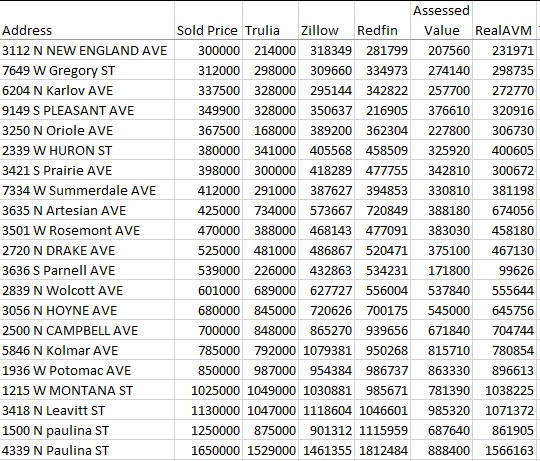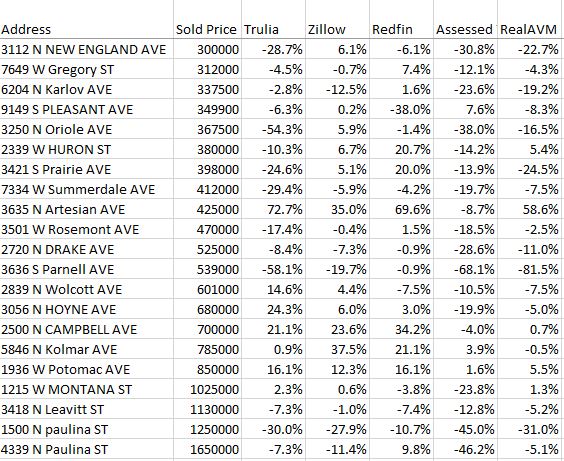It seems like everyone has them now – those automated home value estimators that can tell you exactly how much your home is worth in an instant without ever looking inside your home. Obviously, the condition of your home, your layout, room sizes, closets, gizmos, and the level of finishes simply don’t matter. All that apparently matters is easily discernible information like lot size, square footage, neighborhood, and the number of bedrooms and baths.
Ahhh. Technology is wonderful. I think it’s all part of the “big data” movement where computers churn through millions of numbers to spit out millions of other numbers, based upon some mysterious formula, that gain instant credibility because they came out of a computer. Oh…and throw in a reference to “cloud computing” and it garners even more credibility. (BTW, cloud computing has been around for decades. We used to call it time-sharing…like in the 60s.)
The latest entrant into this crowded field is Redfin. I got an email last week from their “Midwest Communications Specialist” encouraging me to write about the launch of their new home value estimator, which they claim is the industry’s most accurate. I guess he doesn’t realize that Redfin is Lucid Realty’s closest direct competitor or he doesn’t care (disclosure to you on what follows BTW). Normally I try to avoid posts that directly discuss specific competitors but I’ve actually been meaning to do a post on the broader topic of automated home valuations for a while anyway, comparing the various tools on the market to see which were the worst. So the timing of his email was excellent and he did extend an invitation to me so I’m accommodating him.
Here is an excerpt from the Redfin email I got:
As a brokerage, Redfin has 100% access to MLS data, allowing us to get not just the basics on a home, but literally hundreds of other bits of data, such as whether it’s on a major street, if it has a nice view, if the basement is unfinished and if it sits on the waterfront. Data such as that makes a big difference in creating an accurate estimate.
Because of rule-changes by the NAR, as well as the rise of cloud computing, we’ve now been able to create a public-facing estimate tool…
Please note that all the home value estimators out there are run by companies with 100% access to MLS data so I don’t see any unique advantage here and I’m not impressed by the magic of cloud computing any more than I am by the magic professed by most realtors.
The email claimed a really low median error rate but you know what? When it comes to error rates medians don’t tell you much. What good does it do you if 50% of the estimates + 1 have no error (median error rate = 0%) and the other 50% – 1 are off by 100% – especially since you don’t know ahead of time which 50% you are in. Anyway, Redfin publishes more meaningful accuracy data and it shows that for Cook County 88.9% of active listings eventually sell within 10% of their estimated value but only 54.8% of off-market properties eventually sell within 10% of the estimated value. Redfin explains that once a property is listed for sale they have better information on it but their unlisted error is really bad.
I wanted to see first hand how the new Redfin tool and others perform so we randomly pulled around 20 of the most recent single family (for some reason Zillow wasn’t estimating any condos on the day I did this) home sales in Chicago above $300,000 and compared the various guesstimates to the actual sales prices. In addition to the well known public home value estimators I included estimates from Corelogic’s Realist and the Cook County Assessor’s 2015 assessed values for comparison purposes. I then calculated the errors, along with the average of the absolute value of those errors.
I don’t claim that this is statistically significant or scientific but I just wanted to provide a real feel for how these guesstimates can go off track. Here are the average errors for my sample and I provide the underlying data in tables below for your own amusement:
- Redfin 13.6%
- Trulia 21.0%
- Zillow 11.0%
- Cook County Assessor’s Office 21.5%
- Realist AVM 15.4%
Before I go any further I should point out what might be obvious to many: nobody really knows how accurate realtor comparative market analyses (CMAs) are so they might be just as bad as these automated home value estimators for all I know. However, at least the realtor can look inside the house and apply some common sense – to the extent that the realtor has common sense.
Anyway, I made a few interesting observations while working on this analysis. First, although Trulia and Zillow are now part of the same company their guesstimates are still different. Also, the Cook County Assessor’s office doesn’t do so well and if you look at the actual errors in the second table below you’ll see that their guesstimates are biased on the low side, which is unforgivable if it holds true in the larger population. (Any downward bias should be immediately eliminated by adjusting all estimates by the amount of the bias.) Frankly, it looks like the Cook County Assessor’s office could simply do better by eliminating their assessment staff and just using the Zillow guesstimates.
The other peculiarity with these home value estimators is that none of them have taken the most obvious and trivial steps to improve their accuracy. Namely, what’s the point of showing an estimated valuation higher than the current list price? You already know it’s unlikely to sell that high so why not just cap the valuation at the list price? Furthermore, for homes sold in the last 6 – 12 months what’s the point of showing a value any different than what it last sold for? Isn’t a recent sale price the best estimate of the home’s value?
But at the end of the day these purveyors of random data don’t really care about the accuracy of their estimates, other than to maintain some semblance of credibility, because the main purpose of these tools is to generate seller leads. Basically, these tools are nothing more than bait. Give them your contact information and you will be contacted by at least one realtor within 24 hours. I’m going to write more about this some other day but a potential seller’s name and address is easily worth $50 or more to these Web sites.
#HomeValues #HomeValueEstimator #HomeValuation
Gary Lucido is the President of Lucid Realty, the Chicago area’s full service discount real estate brokerage. If you want to keep up to date on the Chicago real estate market, get an insider’s view of the seamy underbelly of the real estate industry, or you just think he’s the next Kurt Vonnegut you can Subscribe to Getting Real by Email using the form below. Please be sure to verify your email address when you receive the verification notice.


